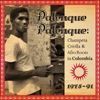"Palenque Palenque: Champeta Criolla & Afro Roots in Colombia 1975-91"
 The major recurrent theme for Soundway compilations is documenting that fragile and fleeting period when two cultures collide and the resulting music still seems exciting, fresh, and revolutionary. Palenque Palenque certainly fits nicely within that aesthetic, but the absorption of African music into Colombia did not follow a predictable path all, as this is a deeply strange and somewhat baffling album (albeit quite a likable one). Rather than sounding like a Latinized Fela Kuti, some of the artists more closely resemble a young Steve Reich on amphetamines trying to construct an Afro-Latin dance album from tape loops.
The major recurrent theme for Soundway compilations is documenting that fragile and fleeting period when two cultures collide and the resulting music still seems exciting, fresh, and revolutionary. Palenque Palenque certainly fits nicely within that aesthetic, but the absorption of African music into Colombia did not follow a predictable path all, as this is a deeply strange and somewhat baffling album (albeit quite a likable one). Rather than sounding like a Latinized Fela Kuti, some of the artists more closely resemble a young Steve Reich on amphetamines trying to construct an Afro-Latin dance album from tape loops.
Champeta was born in the early '70s when soukous, highlife, and Afrobeat records started finding their way into Columbia around the same time that sound system culture was beginning to flourish.Notably, Colombians took to these new African sounds much more enthusiastically than any other country in their vicinity—in fact; co-compiler Lucas Silva is quite fond of proclaiming that Colombia was the first (only?) "Afrobeat nation" outside of Africa.This seeming anomaly actually has some very logical roots, as the north coast of Colombia featured quite prominently on the slave trade route and gradually became home to many displaced Africans who resisted completely assimilating themselves into Columbian culture.
Naturally, covering the hottest African music of the day quickly became quite a common practice for musicians in Cartagena and Barranquilla, but it is quite hard to fathom just how that ultimately progressed into something like Cumbia Siglo XX's "Negala Pedale," which begins with spastic auctioneer-like vocals before kicking into what sounds like a two-note locked groove.It's so ridiculous that it seems far more like a provocation than an honest attempt at a song ("Oh, you like to dance, do you? Try to dance to this, you bastards!").Unexpectedly, however, that "locked groove" aesthetic is strewn all over the rest of the album, encompassing everything: percussion, bass lines, guitar parts, and even vocals.Most of the tracks on Palenque Palenque are built are built upon endlessly repeating loops of frenzied funkiness coupled with similarly insistent call-and-response vocals.Often, the only fluid elements are the lead vocals and (maybe) some drum fills.In fact, some songs are repetitive to such a deranged degree (particularly Son Palenque) that they veer quite firmly into avant-garde territory, a truly odd place for dance music to wind up (especially when it originates from poor ghettos with a—possibly undeserved—reputation for violence).Also, it is both charming and mystifying to hear exuberant live musicians emulating loops.
The popularity of sound systems must have played an enormous role in shaping the improbable Champeta sound, as nearly all of the contributions seem to be based upon a very simple and true premise: all you need to get some asses on the dance floor and make them go wild is a great beat and a hook that becomes instantly familiar.A handful of overachievers go beyond the formula a bit and write some cool, fully-formed songs (Bandos Los Hijos De La Niña Luz, for example) or display great musicianship (like La Tromba), but most sensed that when people are having the time of their lives, they do not care what the hell is being sung or if the trombone player has sick chops.At least I hope that is the case. Otherwise, I have no explanation for the cartoonish duck impressions in "La Negra Kulende" or the onomatopoeic gibberish of "Burumburumbum."
On one hand, it is pretty easy to see why Champeta's popularity was relatively brief and highly localized and why Silva and Soundway's Miles Claret had to do quite a bit of scavenging to assemble this album, as dance music has a definite sell-by date and always falls victim to the next cool thing that comes along.Also, sometimes aggressive Latin rhythms make me feel like I am trapped in an elevator with a hyperactive child.On the other hand, however, it is abundantly evident why Silva has dedicated his life to preserving this music (he runs a Champeta-centric label of his own): Colombia has a thoroughly vibrant, weird, raucous, and unique musical legacy that almost no one has had a chance to hear.Palenque Palenque makes me very nostalgic for those wonderful days when wild and creatively fertile new scenes could still erupt and flourish in cultural isolation, vanish before becoming lame or commodified, then resurface to startle people like me several decades later.
Samples:
- La Nelda Pina – El Sucusu
- Cumbia Siglo XX – Naga Pedale
- Banda Los Hijos De La Niña Luz – Dejala Corre
 




